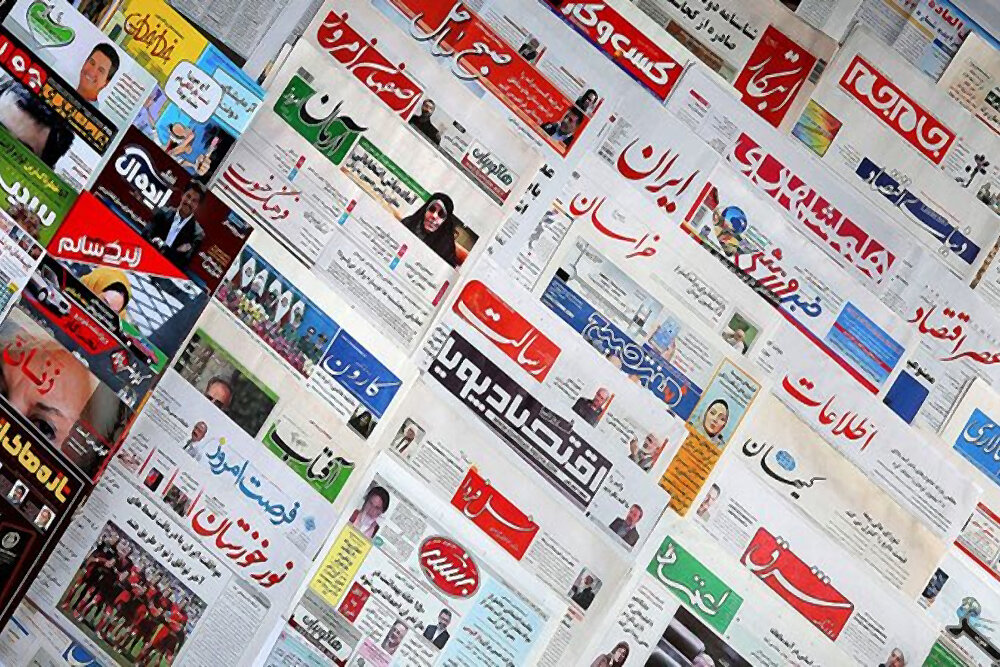TEHRAN PAPERS

The Iran newspaper wrote in a commentary on Amir Abdollahian’s visit to Oman. It wrote: “Interaction” is a fixed tactic that Omanis have in their attitude to most regional and extra-regional issues. However, in order to achieve this goal through hard work and patience, they test many ways until they mediate between important competitors such as Iran and Saudi Arabia, as well as Iran and the West about the nuclear issue.
In the current situation, when the Iranian and Saudi authorities reached an agreement to resume relations, the plan of the opponents, such as the Zionist regime, to deepen regional divisions have been neutralized and Oman’s effort as a well-known regional mediator have launched a move to revitalize negotiations to remove the sanctions on Iran and to close nuclear issue, a step that can be decisive to create a calm and peaceful atmosphere in the region. after meeting with his Omani counterpart, Amir Abdollahian said: “Muscat with a new initiative has launched a new round of consultations to untie the negotiations’ knot.”
Considering the rapid changes that are taking place between Tehran and Riyadh in resuming relations, which indicates the victory of the regional diplomacy of the 13th government, it seems that Washington’s decision and its return to commitments can bring a constructive end to Oman’s mediation efforts.
Etamad: Principlists’ differences about upcoming elections
In an analysis, Etemad addressed the situation of the principlist camp in the upcoming parliamentary elections, which will be held about 10 months later. It wrote: The differences in the principlist camp on various issues to capture the 12th parliament, have become so public that the unity scenario has failed for the election in Esfand 1402 (March 2024).
The demonstrative show of unity of the principlists in the last two elections – the 11th parliament and the 13th presidency – in the absence of an old rival - the reformists - did not even last until the 12th parliamentary election, and from 1401 (2022) it became clear that the game of presenting candidate lists and the candidate on the top of the list is not so serious and one should wait for different lists by the principlist camp, and the unified governance turned into a field of competition between principlists rather than a success for the country.
Arman-e-Emrooz: Ballot box and diplomacy
In a commentary, Arman-e-Emrooz discussed the impact of the upcoming parliamentary elections on the country’s foreign policy. It wrote: Today, we are seeing that the countries of the world are spending a lot of money to encourage people to take part in the elections as much as possible and keep their country’s image clean in the eyes of the world. Election presents a unique opportunity so that if it is implemented correctly, it can remove pressure on the country.
Today, various aspects of diplomacy and international relations are dependent on elections, and this component should be highlighted seriously. Today, one of Iran’s most important issues is negotiating with the West, and don’t doubt that if free elections are held and people’s participation in the elections increases, it will be easier to launch negotiations with the West and accomplish the goal of lifting sanctions by reviving the JCPOA. Therefore, it is important to hold competitive elections and just the percentage of voter turnout is not important. We also saw a high percentage of participation in the Soviet Union, Iraq, and North Korea, but their elections were never free and were not accepted by the international community.
Ham Mihan: Loved by Shia and Sunni
In a column, Ham Mihan reported on Ayatollah Soleimani’s martyrdom in the shooting attack (in Babolsar) and wrote about the various aspects of his personality. Seyyed Baqer Hosseini, representative of Zabul in the 10th Parliament, told Ham Mihan about Soleimani that “he was a prominent scientific figure and a great orator; and he was a representative of Sistan-Baluchistan province for almost two terms, which is unprecedented.” Pointing out that he had a good moral character, he added: “There, too, all his emphasis was to create unity, empathy and integration of the people of the province, both Shia and Sunni.” His view in Sistan-Baluchistan was the fatherly view of the Leadership in the province and he was responsive to all people. For this reason, he was a beloved character among the people and was always chosen by Shia and Sunni.”
Siasat-e-Rooz: Hypocrisy of the West on issue of human rights
In its editorial, Siasat-e-Rooz addressed the West’s claims about human rights concerns in Iran and the bad situation of some Western countries in this regard. It wrote: These Western countries, which every day invent new excuses and make claims to present themselves as saviors of Iranian people, but in fact prescribe “chaos and confusion,” the question is that if these countries really believe in their own claims, why do they still insist on remaining in power or at least do not hold referendums in their countries. It is more regrettable that those media that claim support for humanity are silent about these issues and support the ruling structures of these countries. The Western leaders’ gestures of support for human rights are not genuine and their main goal is to repeat the scenarios of war-hit countries, such as Libya, Sudan, Iraq, Syria, etc., in Iran.

No comments:
Post a Comment